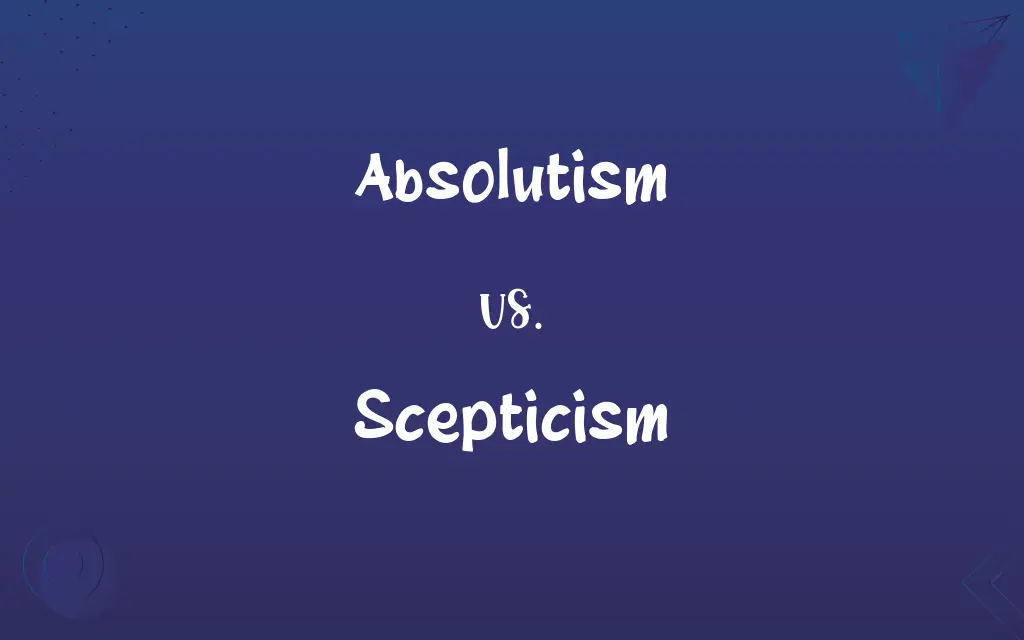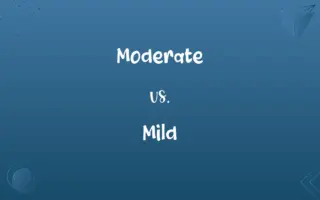Absolutism vs. Scepticism: Know the Difference

By Shumaila Saeed || Published on January 3, 2024
Absolutism asserts that certain truths or values are universally valid, while scepticism questions the certainty or reliability of knowledge.

Key Differences
Absolutism, in a philosophical context, refers to the belief in absolute principles in moral, ethical, or epistemological matters. It implies that certain truths or values are universal and unchanging. Scepticism, conversely, challenges the certainty of knowledge, promoting doubt and questioning the reliability of what is considered 'true' or 'absolute'. This philosophical dichotomy places absolutism in the realm of certainty, while scepticism thrives in uncertainty and questioning.
Shumaila Saeed
Jan 03, 2024
In moral absolutism, there's a conviction that moral rules or laws are universally applicable, regardless of context or situation. Sceptical approaches to morality, however, argue that ethical truths are not fixed and can vary based on context, culture, or individual perspectives. While absolutism seeks clear, unambiguous moral directives, scepticism embraces the complexity and relativity of moral judgments.
Shumaila Saeed
Jan 03, 2024
Absolutism in politics denotes a system where ultimate authority is concentrated in a single figure or group, often without checks or balances. Political scepticism, on the other hand, involves a critical attitude towards authority and governing systems, questioning their legitimacy and efficacy. Absolutism favors unquestioned obedience to authority, whereas scepticism encourages scrutiny and critical evaluation of those in power.
Shumaila Saeed
Jan 03, 2024
Epistemologically, absolutism upholds the possibility of certain, unchallengeable knowledge or truth. In contrast, epistemological scepticism questions whether anything can be known with absolute certainty, often leading to a more tentative approach to knowledge and understanding. Absolutism asserts definitive knowledge, while scepticism doubts the very possibility of such certainty.
Shumaila Saeed
Jan 03, 2024
Religious absolutism involves unwavering adherence to specific doctrines or teachings, viewing them as universally true and applicable. Scepticism in religion often manifests as doubt about religious claims or teachings, advocating a more individualistic or questioning approach to faith. Here, absolutism clings to unassailable beliefs, whereas scepticism encourages a more personal, exploratory relationship with religious ideas.
Shumaila Saeed
Jan 03, 2024
ADVERTISEMENT
Comparison Chart
Approach to Truth
Asserts universal, unchanging truths
Questions certainty, promotes doubt
Shumaila Saeed
Jan 03, 2024
Moral Philosophy
Believes in universal moral rules
Views morals as relative, context-dependent
Shumaila Saeed
Jan 03, 2024
Political View
Favors concentrated authority, often unquestioned
Encourages scrutiny and questioning of authority
Shumaila Saeed
Jan 03, 2024
Epistemology
Upholds the possibility of certain knowledge
Doubts certainty, advocates tentative understanding
Shumaila Saeed
Jan 03, 2024
Religious Beliefs
Adheres strictly to doctrines
Encourages questioning and individual interpretation
Shumaila Saeed
Jan 03, 2024
ADVERTISEMENT
Absolutism and Scepticism Definitions
Absolutism
Unwavering adherence to a particular doctrine or ideology.
Her moral absolutism guided all her decisions and judgments.
Shumaila Saeed
Dec 20, 2023
Scepticism
Doubt or disbelief regarding the truth or reliability of something.
His scepticism about the project's success led him to ask challenging questions.
Shumaila Saeed
Dec 20, 2023
Absolutism
A system of government where power is centralized in one authority.
The monarch ruled with absolutism, controlling all aspects of governance.
Shumaila Saeed
Dec 20, 2023
Scepticism
A cautious or critical approach to accepting information.
His natural scepticism made him a careful and discerning reader of news.
Shumaila Saeed
Dec 20, 2023
Absolutism
A philosophical stance that rejects relativism or skepticism.
In the debate, he defended absolutism, arguing against moral relativism.
Shumaila Saeed
Dec 20, 2023
ADVERTISEMENT
Scepticism
The practice of questioning and critically examining beliefs or claims.
The scientist's scepticism drove her to conduct thorough experiments.
Shumaila Saeed
Dec 20, 2023
Absolutism
A political theory holding that all power should be vested in one ruler or other authority.
Shumaila Saeed
Dec 13, 2023
Scepticism
A philosophical attitude questioning the possibility of certain knowledge.
Her essay explored scepticism in epistemology, challenging traditional beliefs.
Shumaila Saeed
Dec 20, 2023
Absolutism
A form of government in which all power is vested in a single ruler or other authority.
Shumaila Saeed
Dec 13, 2023
Scepticism
Doubtfulness about the validity or authenticity of something.
There was widespread scepticism about the authenticity of the discovered artifact.
Shumaila Saeed
Dec 20, 2023
Absolutism
(theology) Doctrine of preordination; doctrine of absolute decrees; doctrine that God acts in an absolute manner.
Shumaila Saeed
Dec 13, 2023
Absolutism
The principles or practice of absolute or arbitrary government; despotism.
Shumaila Saeed
Dec 13, 2023
Absolutism
(philosophy) Belief in a metaphysical absolute; belief in Absolute.
Shumaila Saeed
Dec 13, 2023
Absolutism
(rare) The characteristic of being absolute in nature or scope; absoluteness.
Shumaila Saeed
Dec 13, 2023
Absolutism
The state of being absolute; the system or doctrine of the absolute; the principles or practice of absolute or arbitrary government; despotism.
The element of absolutism and prelacy was controlling.
Shumaila Saeed
Dec 13, 2023
Absolutism
A form of government in which the ruler is an absolute dictator (not restricted by a constitution or laws or opposition etc.)
Shumaila Saeed
Dec 13, 2023
Absolutism
A belief in absolute, unchanging truths or principles.
His political absolutism left no room for debate or dissent.
Shumaila Saeed
Dec 20, 2023
Absolutism
The practice of asserting absolute control or authority.
The CEO's management style was criticized for its absolutism.
Shumaila Saeed
Dec 20, 2023
Repeatedly Asked Queries
Does absolutism allow for different opinions?
Absolutism typically does not accommodate varying opinions, as it upholds fixed truths.
Shumaila Saeed
Jan 03, 2024
How does scepticism affect scientific research?
Scepticism drives scientific inquiry by encouraging questioning and verification of hypotheses.
Shumaila Saeed
Jan 03, 2024
Can scepticism lead to indecision?
Yes, excessive scepticism can sometimes result in indecision or paralysis in judgment.
Shumaila Saeed
Jan 03, 2024
Is moral absolutism inflexible?
Moral absolutism is often inflexible, adhering strictly to set moral laws or principles.
Shumaila Saeed
Jan 03, 2024
Can scepticism be applied in everyday life?
Yes, scepticism can be applied daily as a tool for critical thinking and decision-making.
Shumaila Saeed
Jan 03, 2024
Can absolutism be democratic?
Absolutism is generally at odds with democracy, as it centralizes power rather than distributing it.
Shumaila Saeed
Jan 03, 2024
How does scepticism influence religious beliefs?
Scepticism can lead to questioning and re-evaluation of religious beliefs.
Shumaila Saeed
Jan 03, 2024
Is scepticism always negative?
Scepticism is not inherently negative; it's a critical approach that can lead to more informed decisions.
Shumaila Saeed
Jan 03, 2024
Does political absolutism require a monarchy?
Political absolutism often, but not always, occurs under monarchical rule.
Shumaila Saeed
Jan 03, 2024
Can a sceptic be religious?
Yes, a sceptic can be religious but may approach religious teachings with questioning and critical thinking.
Shumaila Saeed
Jan 03, 2024
How does absolutism impact freedom of expression?
Absolutism can limit freedom of expression by not tolerating dissenting views.
Shumaila Saeed
Jan 03, 2024
Is absolutism common in modern politics?
Absolutism is less common in modern democracies but can be seen in authoritarian regimes.
Shumaila Saeed
Jan 03, 2024
What is the role of absolutism in ethics?
In ethics, absolutism plays the role of providing unambiguous guidelines for moral conduct.
Shumaila Saeed
Jan 03, 2024
Are there different types of absolutism?
Yes, there are various forms, including moral, political, and religious absolutism.
Shumaila Saeed
Jan 03, 2024
Is scepticism beneficial in education?
Scepticism can be beneficial in education by encouraging critical analysis and independent thought.
Shumaila Saeed
Jan 03, 2024
Can absolutism lead to dogmatism?
Absolutism can lead to dogmatism when beliefs are held without question or scrutiny.
Shumaila Saeed
Jan 03, 2024
Does absolutism allow for change?
Absolutism is often resistant to change, adhering to established norms or truths.
Shumaila Saeed
Jan 03, 2024
How does scepticism impact media consumption?
Scepticism leads to more critical and discerning consumption of media and information.
Shumaila Saeed
Jan 03, 2024
Can scepticism coexist with faith?
Scepticism can coexist with faith, often leading to a more personal and considered form of belief.
Shumaila Saeed
Jan 03, 2024
Is scepticism a part of the scientific method?
Yes, scepticism is a fundamental part of the scientific method, promoting inquiry and evidence-based conclusions.
Shumaila Saeed
Jan 03, 2024
Share this page
Link for your blog / website
HTML
Link to share via messenger
About Author
Written by
Shumaila SaeedShumaila Saeed, an expert content creator with 6 years of experience, specializes in distilling complex topics into easily digestible comparisons, shining a light on the nuances that both inform and educate readers with clarity and accuracy.































































